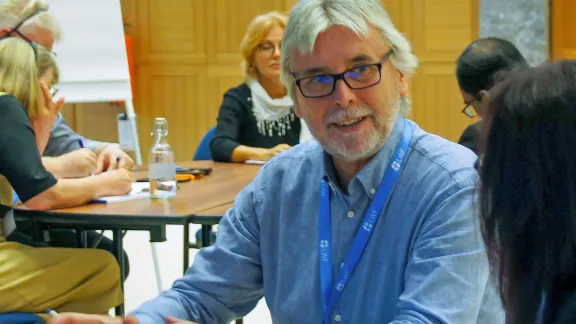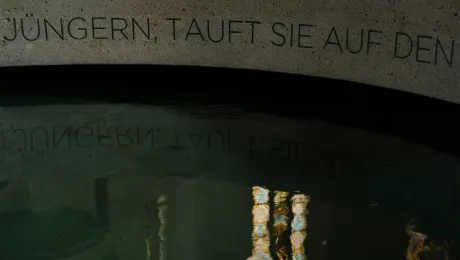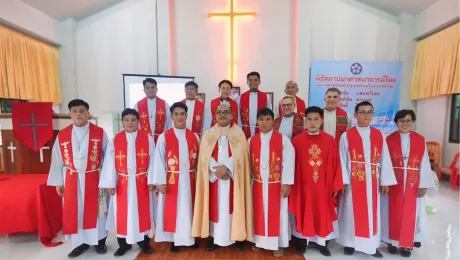In this Voices from the Communion, Bishop Ivan El’ko looks back on his journey to ministry during the Soviet era and reflects on the challenges facing Christians in the region today.

Photo: Bishop Ivan El’ko during a September 2022 retreat for newly elected Lutheran leaders in Geneva. Photo: LWF/C. Kästner
Voices from the Communion: Bishop Ivan El’ko, Evangelical Church of the Augsburg Confession in the Slovak Republic
(LWI) - As the son of a Lutheran pastor, growing up in Cold War Czechoslovakia, Ivan El’ko says he “never imagined that communism could come to an end.” Until 1989, he says, “I was convinced that I would die for my faith. But then, suddenly, the question became “How am I going to live for my faith” in the newly liberated nation?
Today, after 30 years in parish ministry, Rev. El’ko serves as General Bishop of the Evangelical Church of the Augsburg Confession in the Slovak Republic. Speaking about the challenges for church leaders in the region, he notes that during the communist era, people faced very straightforward questions about whether or not they believed in the existence of God.
“Nowadays, our spirituality is not so black and white and it is harder to orient ourselves," he reflects. “Today we have a whole spectrum of colors and our pastoral work is more complex as we try to guide people in their relationships with God.”
Tell us about your early life and your decision to follow in your father’s footsteps?
Although my father was a pastor, I had no plans to follow him into the ordained ministry. Officially I was a Lutheran and I sat in church every Sunday, but I felt no interest or connection to my own life. I was not really a believing Christian and I led a very carefree life, until one day in February 1982, I suddenly knew that I wanted to study theology and become a pastor too.
What do you think influenced that sudden decision?
No one influenced me and I didn’t have anyone with whom I could share my feelings. My father was an immensely loving person, but we didn’t discuss personal issues as a family. There were no youth groups or other church activities, and I couldn’t talk about it with my peers as I had no real knowledge or understanding of the faith. Sometimes I feel like the 4th century Bishop Ambrose who was chosen to lead the church in Milan before he became a baptized Christian!
It sounds like quite a difficult choice for you as a young man?
Yes, it was and in my pastoral ministry with young people, I always encourage them to be grateful for all the opportunities they have to meet and discuss things together. But on the other hand, I understood what it meant to be really alone, and I think growth in the Christian faith is a balance between being alone and being part of a community.
I grew up in a village about 100 kilometers away from Bratislava and my first opportunity to meet with other young Christians was when I came to study at the theology faculty here. It was a huge moment of spiritual nourishment and I fell in love with theology – a feeling which has stayed with me until today.
How hard was it to study theology at that time of communist and atheist dictatorship?
From a spiritual perspective, communism and I have always been sworn enemies. I was deeply disturbed by its ideology, in a similar way that the Jewish people abhorred the worship of other idols. I felt pained by the way it offered a pseudo-religion in the place of God, just as I was troubled by the lack of freedom and human rights.
It also affected my personal life as I struggled with this conflict and did not want to inflict this unhappy situation on anyone else. I fell in love but did not want to commit to marriage because of the political difficulties. Fortunately, love prevailed, and we were married in 1987, the same year that I was ordained and sent to serve my two years of obligatory military service.
And then, in 1989, the communist regime collapsed...
Yes, it was quite unimaginable for me! I heard about it on the radio and even today, I still wonder how it happened so quickly. My situation was also tragicomic, in the sense that, since my sudden conversion, I always thought I would somehow have to die for my faith. But then I became aware that I needed to undergo a radical change and the real question was how was I going to live for the faith in this new era?
You returned to your hometown to serve in your old church, didn’t you?
Yes, not long after I started in the army, my father died suddenly and I learned that his congregation had asked for me, even though they had to wait for two years until the end of my military service. I worked there in the village of Krainé for ten years, living in the same house where I grew up as a child and stayed silent about my questions of faith. My wife understands how important it is to share personal testimonies with our own children and I can say that, at the ages of 29 and 31, they are active Christians - the greatest joy of my life.
After that I was called to serve as pastor in Nitra, a city where the first Lutheran church was being built and I stayed there for 20 years – another fantastic and joyful experience. I always thought I would remain in parish ministry, with my wife and I sharing the destiny of a local congregation. When I was elected as bishop in December 2018, our lives changed completely but we accepted this new vocation, with my wife volunteering at the university pastoral center.
What are the biggest challenges facing the church in your region today?
There are many, but the most important question is how to support people in their relationship with God. How to help them become aware that we are truly liberated by God’s grace in our lives. Under communism, orientation in life seemed to be much simpler, more black and white, good or evil, Christian or atheist? But now we have a whole spectrum of colors and a thousand ways of being Christian, of understanding and living one’s life, so the pastoral dimension of our work is much more complicated.
What does it mean for your church to be a part of the Lutheran World Federation?
Our Slovak church is a founding member of the LWF and over the past 70 years, members of our church have also worked for the global communion of churches. Our membership was never just a formal affair, but rather we have always tried to participate fully in the structures, the leadership and the commissions of the LWF, bringing our own contribution: we really hope it will continue in this way!


